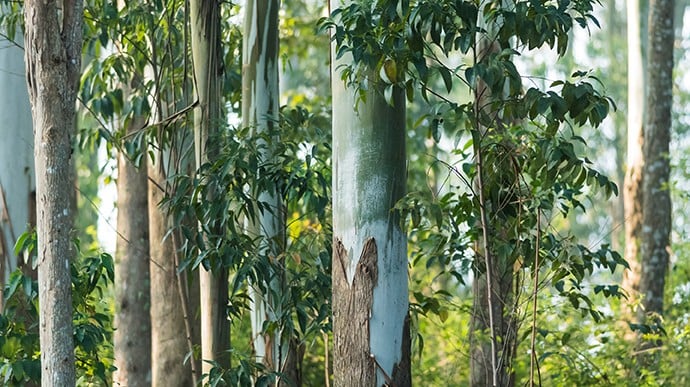
Dr Steven Hussey completed his undergraduate studies at the University of Pretoria (UP). He holds an MSc and a PhD, and has been doing research at UP for the past eight years since completing his doctoral studies.
“Doing research at UP has allowed me to work with some of the top plant biologists in the country,” Dr Hussey says. “I grew up within the UP environment, so it was natural for it to become my academic home. Not only does UP have a world-leading forest biotechnology institute, FABI, but it also has longstanding collaborations with some of the top forestry industry partners in the country.”
Dr Hussey’s research is focused on the genetic control of wood development and its improvement. Wood and wood-based products are renewable, and are essential components of daily life; this includes everything from timber to paper, textiles and foodstuff. Researchers are regularly finding novel applications for products derived from woody biomass.
“By understanding how wood is formed – that is, the biological pathways involved in its development – we can potentially manipulate and improve both wood property traits and the yield we obtain per unit area of plantation,” he explains.
A major milestone for Dr Hussey was receiving the US Department of Energy Joint Genome Research (DOE-JGI) grant to synthesise the largest panel of synthetic gene constructs for eucalyptus in the world (published 2019).
“Linked to that, I was successful in getting a National Research Foundation Competitive Support for Rated Researchers grant in 2021, which valorises the DOE-JGI research by using these gene constructs to screen thousands of interactions between potential genes that might control wood formation. This is an unprecedented undertaking in forestry research.”
Within his academic discipline, Dr Hussey is a group leader on the transcriptional regulation and bioengineering of wood formation, collaborating closely with other tree biotechnology researchers at FABI such as Professor Zander Myburg, Prof Sanushka Naidoo and Prof Eshchar Mizrachi.
“I work on the network of genes that control how wood develops in trees along a spatio-temporal gradient,” he explains. “Essentially, I study how certain genes turn on and off at the right time and the relationships between them to coordinate cellular development within trees. We are also testing whether manipulating certain genes can alter wood development. We do this by promoting or inhibiting the function of a particular gene of interest and observing what effects this has on tree growth, biomass and wood property traits.”
As for inspiration in his research effort, he credits his PhD advisors for their constant encouragement. “Their advice, mentorship and training helped me to launch my career and pursue my research focus.”
He also has a great number of academic mentors and role models.
“One particularly influential academic role model is Prof Jim Haseloff of the University of Cambridge, who is a world leader in plant synthetic biology but who also exercises incredible humility, pursues projects with a strong community engagement focus rather than an obsession with large numbers of high-impact publications, and who has reached out to developing countries to disseminate practical tools and knowledge to stimulate innovation. He embodies what I think is the perfect balance between academic excellence, impact and community benefit.”
Dr Hussey says he does not have one particular ambition regarding his work. “Science is never ‘done’ – the pleasure is in its execution and the dream is having the rare opportunity to contribute new knowledge to humanity.”
Why does his research matter? “Plants possess about 450 gigatons (about 80%) of organically bound carbon present in Earth’s biomass. Of this, nearly 70% is sequestered as woody biomass in trees and other woody shrubs. How is this biomass formed? How it is genetically controlled? How can we manipulate these processes and tailor woody biomass to different downstream applications? By trying to address these questions, my research potentially impacts the most abundant form of biomass on Earth.”
His advice to learners and undergraduate students is to be prepared to be adaptable. The next generation of researchers will require remarkable resilience in a changing world. “It isn’t always a neat linear trajectory. You might change jobs or roles – perhaps even fields of study – a number of times before settling into your dream job. Secondly, remember that buzzwords like ‘biotechnology’ or ‘synthetic biology’ are merely tools or approaches – they are not fields of study in themselves. Focus on building a strong foundation on the pure sciences and upskill yourself in critical future skills like programming.”
Dr Hussey says he loves nature and music. “I am (was!) an accomplished pianist, and I love bonsai, gardening and reefing (reef tank aquaculture).”
 Story
Story
Researchers and postgraduate students from the Forestry and Agricultural Biotechnology Institute (FABI) and the Genomics Research Institute (GRI) at the University of Pretoria contributed to eight articles in a special issue of the journal, New Phytologist.
Copyright © University of Pretoria 2025. All rights reserved.
Get Social With Us
Download the UP Mobile App